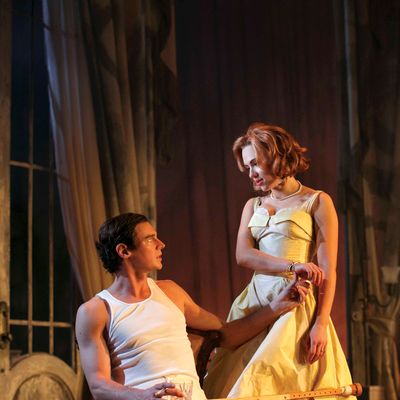
Even now, audiences are lining up to see Scarlett Johansson challenge the structural integrity of her slip as Maggie the Cat, Tennessee Williams’s most bodacious creation: ambitious, lubricious, sex-starved, and ovulating. Your hundred-clams’-worth seems all but guaranteed. And yet the scene-stealer of the evening turns out to be a $5 bath towel. It’s worn by Benjamin Walker, who plays Maggie’s beautiful, inert husband Brick, broken plantation scion, shattered ex-gridiron star, and now celibate sot, still mourning the suicide of his “friend” and teammate Skipper.
Director Rob Ashford, cutting down the chances of Walker’s escape, swaddles the actor in a towel for most of the first act. This probably sounded like a fine idea on paper: Walker (of Bloody Bloody Andrew Jackson) is built like something out of Greek mythology, with digressions into Greek pornography, and having him stalk about the stage mostly nude, as voluptuous Maggie bounces tauntingly around him like a bawdy Pilates ball, seems a reasonable way to get things to a nice rolling boil. Sex — deferred, suppressed, denied — is the steam that drives Cat’s doughty pistons. But there’s something between these two carnal archetypes, something keeping them apart: No, not the specter of homosexuality, nor the stain of betrayal nor the solace of the bottle nor the whole dadburn American exceptionalist-denialist approach to inconvenient truth … No, it’s that cunning terrycloth knot that diapers up Brick’s crotch.
Never in the long history of towels and crotches has there been such a knot. Its closest analog is the tight triangle Boy Scouts form when folding the flag. It holds the towel in place and provides extensive under-armor for the wearer, leaving him virtually invulnerable to “upskirts.” As the strangest thing on stage — stranger, even, than some of the more laaaaavish Delta accents — the Chastity Knot demands our attention. It’s a director’s knot, tied to preserve both a stage vision and the presumed prudishness arrayed against it. It’s a knot of self-cancellation, and the objective-correlative of this whole production: Attractive bodies are arranged artfully; they orbit, but do not attract. A bed dominates the arena-ish boudoir like an open tomb: “When a marriage goes on the rocks, the rocks are there, right there!” snarls Big Mama (a warmly grotesque Debra Monk) and she’s spot-on: There’ll be many a merry chase ’round that bed—but no palpable danger of anyone falling into it.
Johansson puts up a hell of a fight in the first act, but even her radiance is no match for a staging that seems to absorb and diffuse heat as fast as the actors can generate it. She starts strong, a ready pugilist, and she has to be: Act One belongs entirely to her. Yet Johansson’s Maggie resides not in her blooming body or her more reticent soul, but in her throat: The character seems like a meticulous aural creation, and feels oh-so-created. The accent itself is forgivable — bad Southern accents are acceptable in Williams. (I say this as a Southerner. Nobody does ’em right, though Walker, a Georgian, has more authority.) The problem is, we begin to anticipate Johansson’s rhythms, and any illusion of spontaneity vanishes.
Luckily, Ciarán Hinds’ Big Daddy lopes in for Act Two, and he and Walker strike up a rowdy chemistry. Big Daddy, that champion violator, has always been Cat’s gift and curse: Even Williams had trouble containing and corralling him. He’s the supporting monster to whom all other monsters must give way, and Hinds, regularly employed as a movie heavy, is clearly having a ball. There’s no detail work in his rendition: He just performs like the roof’s on fire — when, in fact, the room remains mystifyingly tepid throughout.

